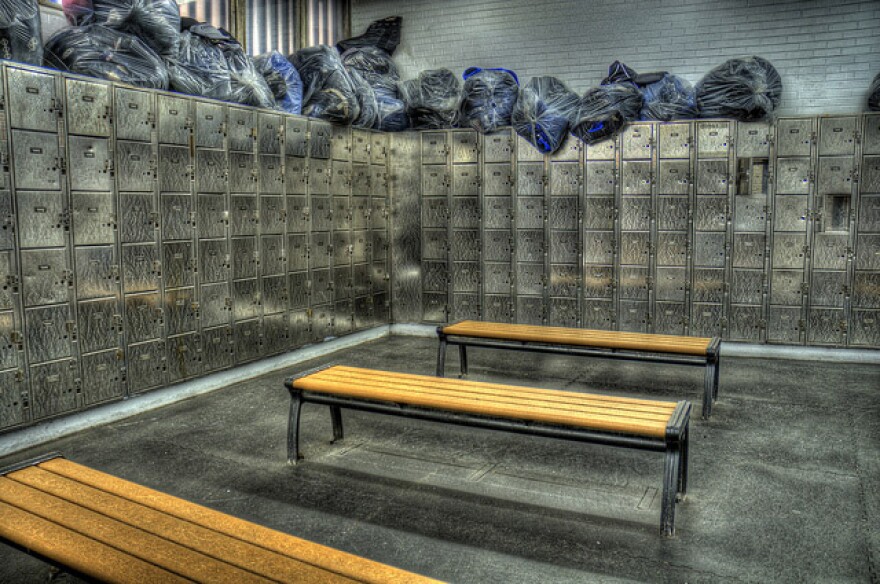When Luc Ryan Schreiber arrived at Yale University, he was an openly gay man on nearly every part of campus. But there was one place where he wasn't: the rugby team.
"I had a coach who used a lot of homophobic language...as the motivation to go faster, push harder, whatever," he says. Meanwhile, he was also seeing "a locker room culture that assumes everyone is straight" from his teammates. "It's not malicious, at least not 99 percent of the time here at Yale, but it is sort of... non-thinking."
A few of Schreiber's teammates knew he was queer, he says, but he really "came out" to the team at the end of the first rugby season. The second he did, he says, the whole atmosphere changed.
"The reaction was great. People immediately recognized some of the things they had done and said, okay, we're going to try to work on this, and it was a vastly different experience on a team level." The coach also left the team at the end of Schreiber's year, and by the time Schreiber was a junior two years later, he'd all but forgotten his early rugby experience.
That's when he was asked by Yale administrators to talk with a freshman on the school's golf team. The new student had questions about being a gay athlete, how to come out to his team, and what he should expect -- and he didn't know whom to ask. So the administrators put the two students in touch. "After that conversation, I was like -- this is weird," Schreiber says. "Because it was very hard for him to find someone. [And when] I went through similar things, I didn't have anyone to talk to."
Now, Schreiber and five other athletes on Yale University's male sports teams have formed a queer athletes' group to change that culture. They chat together about LGBT issues online, and they're working with the University's athletics department to make athletics more inclusive of trans people and queer men. According to Eric Anderson, a professor of Sport, Masculinities and Sexualities at the University of Winchester in England, the group is a unique one.
"Gay men are often alienated, alone, the only one on their team, and so they often have alienation from other gay men through sport," he says. "I've been researching gay men in sports since 1998, and there's been a huge trajectory in the number of gay athletes coming out of the closet, but it's still very splattershot."
The group is intentionally informal: not so much an official LGBT group, more like a not-so-secret society that other queer and questioning athletes will know they can connect with. Wayne Zhang, on the swimming and diving team, says that's intentional. "One thing that we've been pretty cognizant about is that change in terms of culture will [not] occur when people are dragged [into it]. We want to be more subtle than having specific workshops or seminars."
Zhang has directed a LGBT-affirming video, which will play at the beginning of the next school year, where coaches and students express their support for queer athletes on campus. Small acts like these, he says, "can plant a seed that says queer athletes do exist."
The group is also working with Brian Tompkins, Yale University's associate athletic director for student services, to find ways that athletics can be more inviting for gay men and other LGBT people at Yale. "Traditional locker room behavior is not very PC, I think it's probably fair to say," Tompkins says. "And I don't think the goal is to have kind of squeaky-clean, PC places -- it's just to be more aware."
Tompkins and the group have talked about having more online resources, like an email sent out that lets athletes know about where they can go if they have questions about LGBT issues, and a web page for gay athletes at Yale. Another member of the group, Timothy Cox, has joined the peer liaison program in the university's Office of LGBTQ Resources*, which will make him a point of contact for new students.
Tompkins says the students' drive is making his own job easy. "It's been very educational and informative to me to hear what some of the challenges are that they have as queer athletes," he says. "What's been so impressive to me is how determined and enthusiastic they are to be trailblazers in one respect, but then also trying to create a sense of belonging and normalcy for gay athletes...They're providing the momentum, and I'm just trying to steer it in ways that are helpful to them."
*Correction: This story previously said that Cox was a peer liaison through Yale University's LGBT Co-Op, a student organization. He is a peer liaison with the school's Office of LGBTQ Resources, which is run by the university. The story also said he was the school's first peer liaison, but he is not. The story has since been corrected.

